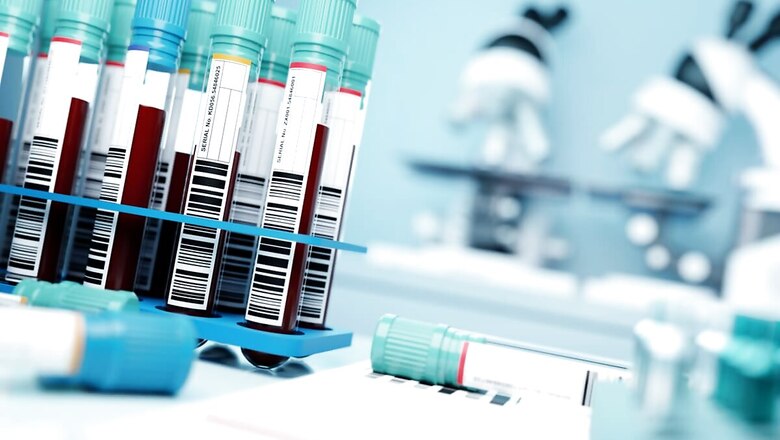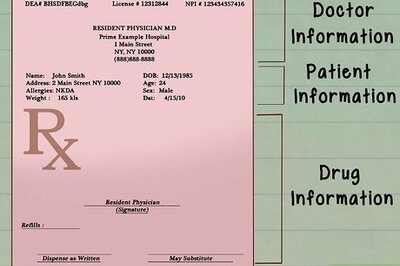
views
As soon as the symptoms appear first advice is to get RT-PCR or Antigen test to confirm nCoV (Novel Corona Virus) infection. Depending on clinical condition a series of laboratory blood test like CBC, CRP, D Dimer, LDH, IL6, LFT, RFT, Blood sugar are advised to decide the line of treatment and prognosis of disease. Some queries related to these test is being discussed here.
CBC
CBC/CBP means complete blood count/picture detects quantitative and morphological changes in blood cells including red blood cells (RBCs), white blood cells (WBCs), platelets (thrombocytes). Infection bring numeric (quantity) and morphological (form/shape) changes in blood cells which helps physician to decide further line of management.
CRP
C reactive protein is an acute phase reactant synthesized in liver. CRP levels increase in blood in response to inflammation and infection. It is mildly elevated in chronic diseases like diabetes and hypertension, moderately elevated in rheumatoid and infectious arthritis and severely elevated in acute bacterial/viral/fungal infections.
D Dimer
Normally inside the vessels, blood does not clot due to natural anti-clotting mechanism. But as soon as there is trauma to the vessels, blood clots to prevent its loss. Similarly if clotting occurs inside the blood vessels, clot breaking mechanism activates to maintain normal flow. This leads to the formation of clot degradation products that clears off in short time.
Diseases and infections can cause excessive clot formation inside the vessels. In response, breaking of clot occurs. This dissolution of clot leads to abnormally high levels of clot degradation products, which may get stuck in smaller vessels leading to sudden death. D dimer is one of the degradation product of clot (fibrin). Raised D Dimer levels indicates excessive blood clotting and need to start anticoagulant (blood thinner) drugs to save the life of patient.
LDH
Lactate Dehydrogenase is an enzyme present in all cells of the body. Its blood level rises in response to damage to the cells due to some disease or infection. Sometime its level may also rise due to strenuous activity or exercise. Different type of LDH specific to organs may give us information regarding damage to that particular organ. This helps a doctor to investigate that organ further for early diagnosis and treatment
IL6
Body immunity releases a substance Interleukins-6, which itself, and by increasing the hepatic (liver) production of substances like CRP and Fibrin, fights infection. A raised blood level of IL6 is indicative of inflammation in response to ongoing infection. It is a non-specific marker as its level increased in many inflammatory disease like rheumatoid arthritis. High level signifies more inflammation and need of anti-inflammatory drug like steroid to protect the host cell.
LFT
Liver function test is a blood test that shows the normal functioning of liver i.e. to produce protein like albumin and to break blood waste products like bilirubin. Lower level of protein and higher level of enzymes in blood are suggestive of compromised liver function. An abnormal LFT is not always suggestive of liver disease; it may be due to many other reasons like infections, drugs.
RFT
Kidney filters blood to remove its waste out of the body through urine. Renal or Kidney function test gives the value of substances like albumin, urea and creatinine filtered by kidney. Abnormal values are indicative of poor filtration capacity of kidney. An abnormal RFT is not only suggestive of kidney disease; it may be due to other reasons like infections and drugs
Urine routine microscopy or Urinalysis
It is a test in which urine is analyzed under microscope to check its appearance, content and concentration. It is a useful investigation to detect and treat urinary tract infections, kidney diseases and diabetes.
Blood sugar test
It is a blood test to measure sugar level in blood mainly to diagnose and treat diabetes. Apart from diabetes blood sugar level get deranged in many other conditions like stress, infections, drug (steroid) treatment.
Pro-calcitonin test (PCT)
It is a blood based biomarker that can be used to identify patient’s response to bacterial infection. It increases 3-6 hours after bacterial infection, peaks after 12-24 hours, then rapidly decreases as infection resolves. In viral infection it remains low. PCT aids detection of secondary bacterial infection and progression of disease. It is also helpful in determining whether the WBC count is raised due to steroid or due to bacterial co-infection.
PCT is an important tool to decide which patient needs antibiotic and hence decreases the overuse of antibiotics which leads to increased adverse events, antibiotic resistance and cost. Several studies show that PCT is a strong predictor of severity and poorer outcome. A value of < 0.25 microgram/l is suggestive of good outcome.
Read all the Latest News, Breaking News and Coronavirus News here.




















Comments
0 comment